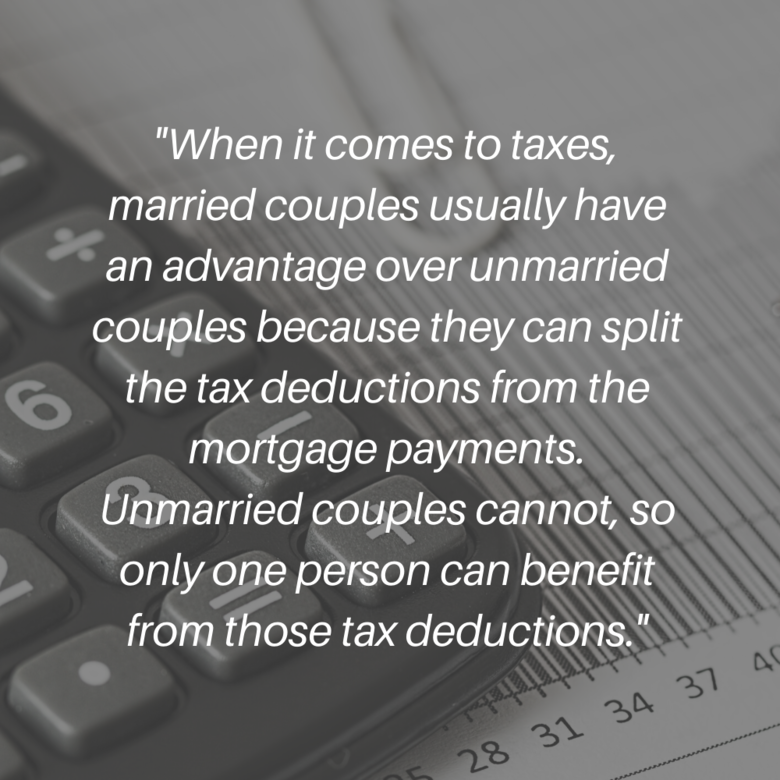The common path walked by couples is to first get married then to buy a property together. But times are changing. A 2013 study by Coldwell Banker Real Estate found that 17% of couples bought a home unmarried, with that number rising to 24% (or one in four) among millennials.

Lisa Taliano
Why would a couple want to buy a property before getting married? We talked to Lisa Taliano, a sales representative at the Julie Kinnear team, who has experience working with both married and unmarried couple buyers.
Lisa explains that:
Purchasing a property together unmarried is financially rewarding and practical as the couple can work together and combine efforts toward enjoying a shared lifestyle of co-habitating, stop paying rent to a landlord, and put their combined incomes towards owning their very own property. This property will likely increase in value over time and the mortgage will shrink, so buying real estate a great investment in the couple's financial future, all while enjoying their lifestyle and desired neighbourhood together.
Taliano also cautions though that,
The con is if the relationship stops, then it can get awkward and financially difficult. Most couples either sell the house, divide the investment dollars, and go their separate ways, or one buys the other out of the property. Alternatively, the home can be rented out to tenants if neither needs the principle dollars invested in the home.
Are you thinking about buying a property as an unmarried couple? If so, there are four big considerations:
- The mortgage application
- The ownership split
- Taxes and expenses
- A cohabitation agreement
The Mortgage Application
Marital status does not affect your chances of getting a mortgage. Your success rate is based on your income, credit history, and assets-to-debt ratio.
A married couple can apply together as a joint unit. The bank will look at both of their credit records and their combined assets and debts when deciding whether or not to grant the mortgage.
An unmarried couple must apply separately or just have one person apply. If you both have similar credit histories and financial ratios, then it doesn’t hurt to both apply. If one person has a much better credit history and financial situation, then it’s better if only the person with the better record applies to increase the chance of getting the mortgage. That’s because the credit decision is based on the lower of the two scores by both applications.
It’s worth noting that getting a mortgage is a big responsibility! Even if you’re not married, if both your names are on that mortgage application, you are both responsible for it, regardless of what happens to the relationship. If you want to sell the property, remember that it can take months, even over a year, to sell depending on the market conditions.
Property Rights
For a married couple, they will automatically have joint and equal ownership over the property. If, for some reason, they were to split up, the courts would divide the asset half-half, regardless of how much each person contributed financially. If one person dies, that person’s ownership would be automatically transferred to the survivor.
For unmarried couples, you have to choose how to divide the ownership regardless of how you obtained the mortgage. There are three big categories of ownership:
- Sole Ownership is when one person has complete control over the property, which makes sense if one person is contributing all or most of the money.
- Joint Tenancy is when two people split the ownership equally
- Tenants in Common is when each person owns a specific percentage of the property, such as 60/40, 70/30, etc.
Sole Ownership is simple and easy. Tenants in Common is very flexible; each owner can sell or take out loans of their share without the consent of the other owner. Joint Tenancy feels good for the relationship, but it can get complicated if one partner wants out and the other doesn’t.
According to the Partition Act in Ontario, if one owner wants out in a Joint Tenancy, the other owner must grant permission. If the owners cannot agree, then either owner can apply for a court order. Usually, the court will allow the owner who wants out to partition, meaning they can sell their ownership to a third party. The courts prefer partition over sale of the property because then the owner who wants to stay in the property can do so. Just remember that going through the court usually means lots of expensive lawyer fees!
Taxes and Property Expenses
When it comes to taxes, married couples usually have an advantage over unmarried couples because they can split the tax deductions from the mortgage payments. Unmarried couples cannot, so only one person can benefit from those tax deductions.
After purchasing the property, there will be many expenses, such as mortgage payments, insurance, utilities, property tax, maintenance, and possibly even renovations. Unmarried couples need to decide how each person will contribute for all these expenses. Perhaps it’s half-half, or by ownership %, or by expense item.
A Cohabitation Agreement
Since there’s no federal legislation in Canada regarding unmarried couples buying property together, real estate lawyers recommend these couples to create and sign a cohabitation agreement (similar to a Prenup Agreement for marriage) prior to making their decision to purchase together. The cohabitation agreement should cover things such as
- What happens to the property if the two of you decide to part ways?
- What happens to the property if you two decide to marry later?
- What happens if one partner wants out but the other doesn’t?
- What happens if one of you becomes disabled or dies?
- Who pays for what expenses?
While such a discussion may be very awkward or difficult, it’s wise to these things down in writing.
How does it work in real life?
An article from the Huffpost gave an example of a young couple, Evan Chung and Karin Fjellman, who bought a condo together for $265,000 in 2013 after dating for 2 years. Fjellman contributed more to the down payment because she had more in savings, but they agreed that Chung will repay her the difference in the future so they can be equal partners in ownership. They opened a joint checking account, which they both contributed equally to for the purposes of monthly expenses. Because they were rushed in buying, they didn’t make a cohabitation agreement. Their lawyers suggest them to get a cohabitation agreement in writing, as it’s not too late, but they are confident that they can work out any situation that arises.
Another article on the MassMutal blog gave a different example. Brian Davis bought a house under Sole Ownership, and his girlfriend at the time moved in and paid rent. When major repair bills came in, Davis paid for them. Later, he and his girlfriend married, and he added her to the deed. Then they set up a joint bank account and paid for repairs and maintenance costs out of the joint account. Davis recommends that
Unmarried people should buy real estate singularly, and if they wish to add a spouse to the deed after marriage, it can be done quickly and cheaply.
To further his point, Davis talked about a close friend who bought a home with a girlfriend, and they broke up 18 months later. At first, the girlfriend agreed to take responsibility for a third of the mortgage, but it quickly became unpleasant for them to have to keep contacting each other to discuss usage and bills.
Final Thoughts
If you are considering buying a home as an unmarried couple, Taliano gives the following advice:
Take your time, understand and discuss the legal commitment, know your budget and finances, and consider all your options. Work with a professional realtor with a great reputation who will guide you protect you throughout the process. The realtor will be able to help you determine locations, neighbourhoods, and style of home, as well as negotiate on your behalf and oversee other tasks associated with purchasing a home. A dedicated realtor will also have good connections, so they can refer clients to mortgage brokers, lawyers, etc. who are all involved and important to the process. It is a big decision and investment, and couples will want an expert(s) in their corner.






